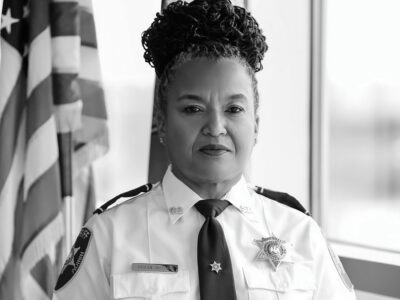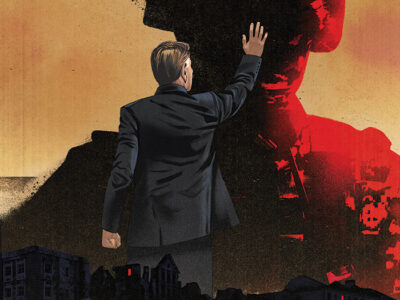
As a Penn student protesting the ground-breaking for the University City Science Center, Mark A. Aronchick, C’71, would have laughed had anyone predicted he would one day represent the city of Philadelphia in litigation to clear even more land for its expansion. “It was probably the single worst judgment in my life that the building of the science center would be bad,” reflects Aronchick, the new chancellor of the 14,000-member Philadelphia Bar Association. (And it was probably one of his best decisions to take his future wife, Dr. Judith Ashbes Aronchick, CW’71, M/INT’78, as a date to that protest.) But even if Aronchick — who once served as the youngest solicitor in the city’s history — has become more practical, he still retains much of the 1960s idealism that defined his years at Penn.
One issue he believes that local lawyers, “as standard bearers for justice,” must address is the short-term effect of welfare reform on social programs. “To avoid living in a ‘Tale of Two Cities’ here in Philadelphia, we have to make sure that what abundance we have from the Rendell administration is shared across this city, because otherwise we won’t recognize this city as a livable place 20 years from now.” Legal-services agencies that assist the poor, he notes, “are straining under increasing demands, and we need to come up with increasing resources to meet the immediate demand.” In response to a charge from two Pennsylvania Supreme Court Justices, Aronchick is convening a legal-services funding summit to raise half a million dollars.
Aronchick likes to say he attended Penn at the best time anyone could have been at the institution, in the late-1960s. “I tried on and took off all kinds of possible careers,” he says. “It was a time when almost all the prerequisites were being stripped down. We were encouraged to take as diverse a range of courses as possible. I hardly met a course I didn’t like.” He chose the law because he believed it would provide an avenue for social change. After graduating from University of Chicago Law School, he returned to Philadelphia to practice law so his wife could attend Penn’s Medical School. (Judi Aronchick is now an associate of radiology at the Hospital of the University of Pennsylvania.)
As the bar association’s chancellor, Aronchick has moved rapidly to champion issues important to him. He brought in an international expert on diversity to present a workshop and has instituted leadership-training programs for women lawyers. Under his leadership, the bar association has begun tutoring and mentoring programs within fifth-grade classrooms in inner-city schools. Aronchick was also planning a “Celebration of Judicial Independence” for the end of April. “At the moment it’s become fashionable to bash judges for being too liberal or soft on crime,” but judicial appointments shouldn’t become “a political football,” he says, referring to the embattled nomination of Judge Frederica Massiah-Jackson to the U.S. District Court. (She later withdrew her name.)
Although it may seem that Aronchick works non-stop, he’s been calling for his colleagues to seek balance in their professional and personal lives. “I think we’re seeing incredibly self-destructive tendencies from people in the legal profession, people who are stressed out and overworked, tunneled into their practice areas, people neglecting their physical health and certainly neglecting their spiritual health.”
One of his outlets, in addition to spending time with his family, is exercise in all forms, from mountain climbing and skiing to power yoga. “I’ll do anything that has a degree of risk to it,” Aronchick says. He takes classes five days a week with power yoga guru Baron Baptiste, who trains the Philadelphia Eagles. What Baptiste has done, he explains, “is taken the ancient traditions of yoga, and put them in a workout regime that’s about the most vigorous physical workout I’ve ever experienced. The pace is completely non-stop. You’re using your own body weight and movement to strengthen and stretch your muscles. You have to learn to focus and concentrate in order to get through it. It helps you stay calm and cool in the middle of chaos.”
A helpful lesson in a high-stress profession. “The be-all and end-all in life is not being a great lawyer, but being as balanced and complete a person as possible,” says Aronchick. “Everything else will follow.”




